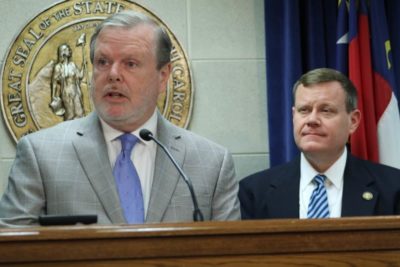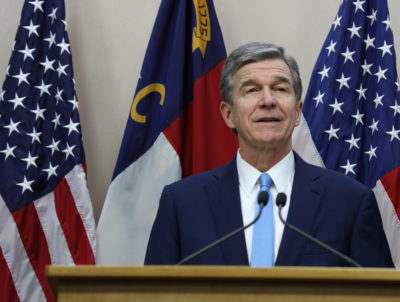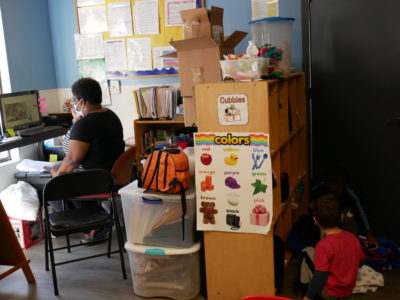
As 2021 comes to a close, it’s a good time to reflect on the progress our state has made — and opportunities missed — to ensure every young child in North Carolina has a strong foundation for life-long health, education, and well-being supported by a comprehensive and equitable birth-to-eight ecosystem. In looking back at the enduring pandemic, influx of federal relief funds, greater focus on the science of reading, continued fight for racial justice, and more, we are reminded how this year has been one for the history books.
We’re highlighting three major developments that have the potential to impact the future of North Carolina’s children, residents, and economy in unprecedented ways: the Build Back Better Act, our state budget, and the Leandro Remedial Plan. Each can propel positive change in North Carolina if we ensure their implementation and work together to shift their shortcomings for young children and families. At the North Carolina Early Childhood Foundation, we’re hopeful for courageous action that will help to realize these and future investments.
Please join us in learning more about these developments below including some areas of overlap and opportunities to dig deeper with early childhood advocates.
Build Back Better Act
The Build Back Better Framework announced by President Biden in October and passed by the U.S. House of Representatives on November 19th can be one of the most transformative federal investments in early childhood in recent history. If enacted, it offers incredible opportunities for young children and families in our state and across the country, most importantly to lift families out of poverty.
| Investment | Total $1.75 trillion across the U.S. including $400 billion for early childhood initiatives. |
| Early Childhood Highlights | The Build Back Better Act tackles the child care crisis in our country and state through policies and investments aimed at improving child care access, affordability, and quality. This includes a mixed delivery system that prioritizes parent choice and adequately compensates its workforce. Its impact is leveraged by expanded free and universal preschool built on existing federal and state programs. Given what we know from research and listening to parents and educators, if enacted and implemented in North Carolina, the benefits of the Build Back Better Act to families, providers, and the economy will be substantial and long-lasting. |
| What’s Next | Before the Build Back Better Act becomes a reality, it needs to pass the U.S. Senate and be signed into law. North Carolina policy makers also need to decide if they will access the federal funds given match requirements and other considerations. |
| Opportunities for Action | Connect with MomsRising, NC Child, and the NC Early Education Coalition to help advocate for the Build Back Better Act and its priorities. This includes listening to and engaging parents, educators, and others with lived experiences in these areas in decision-making. For example, according to a recent poll that included NC voters, we know that paid leave is popular across the political spectrum. |
| Dig Deeper |
North Carolina state budget
For the first time since 2018, North Carolina has a biennium budget for 2021-23. The Conference Budget Proposal was released on November 15th, passed by the General Assembly, and signed into law by Governor Cooper on November 18th. While the budget falls considerably short in many areas impacting young children, it is an important step to continue operating and improving North Carolina’s early childhood ecosystem.
| Investment | Total $25.9 billion for 2021-22 and $27 billion for 2022-23 in North Carolina. |
| Early Childhood Highlights | A major loss is the budget’s failure to fully fund the first two years of the Leandro Plan. Decisions to eliminate corporate income taxes — instead of meeting the state’s constitutional obligation to provide a sound, basic education to all North Carolina children — not only continue barriers, but limit future revenue opportunities to fund these and other areas. Many of the budget’s shortcomings will continue to deepen inequities experienced by children and families of color, children with disabilities, families living in rural areas, and others most impacted by systemic barriers. We are hopeful that some of the missed areas in the state budget, like Medicaid expansion and equitable education funding, may be supported by the Build Back Better Act and advocacy efforts. |
| What’s Next | The budget is signed and ready to be implemented. Some legislative committees will continue discussing specific issues. Efforts to support action around Leandro funding are ongoing. |
| Opportunities for Action | Contact your legislators to advocate for Medicaid expansion with NC Child, worthy wages for early educators with the NC Early Education Coalition, and equitable funding for public education with Every Child NC. |
| Dig Deeper |
Leandro Comprehensive Remedial Plan
The Leandro Comprehensive Remedial Plan, released in March 2021, outlines what is required by the state to meet its constitutional obligation to ensure all North Carolina children have the opportunity to receive a sound, basic education, starting in early childhood. The Plan details the policy changes and budgetary provisions that are to be instituted by the NC legislature over the next eight years to ensure this obligation is met and that our children are prioritized. Learn about the longstanding Leandro case and its journey so far from Education NC.
| Investment | Total $5.6 billion over an eight-year period in North Carolina, including approximately $1.7 billion for the first two years. |
| Early Childhood Highlights | The Leandro case began in 1994 and continues to drag on. Full funding and implementation of the Leandro Plan is necessary to meet the state’s constitutional obligation. The Plan includes several important early learning and education strategies from birth to grade three that align with the NC Pathways to Grade-Level Reading Action Framework and other early childhood initiatives. See resources below to learn more about Leandro’s early childhood priorities. |
| What’s Next | In response to a state budget proposal and its failure to include full funding for the first two years of the Leandro Plan, on November 10th Judge Lee ordered the state to transfer $1.7 billion to the agencies responsible for implementing the Plan. This order was denied by the NC Court of Appeals on November 30th following an appeal from the State Controller. It’s uncertain what will happen next, but it’s possible it may progress to the NC Supreme Court. |
| Opportunities for Action | Join the movement led by Every Child NC; a community-led, statewide coalition of organizations, parents, teachers, and students advocating for equitable funding in public education. Explore their tools and resources to use at the state-level and in your community. |
| Dig Deeper |
And so the work continues. Will you join us?
Recommended reading



